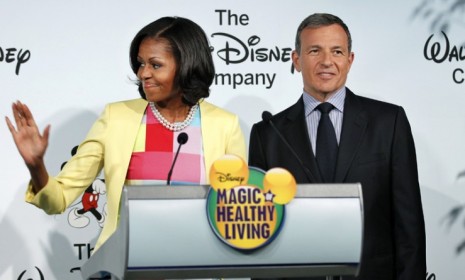Disney's junk-food ad ban: Good for business?
The company, which owns ABC and other TV channels, will no longer carry ads for foods that fail to meet strict nutritional standards — and the move might help its bottom line

A free daily email with the biggest news stories of the day – and the best features from TheWeek.com
You are now subscribed
Your newsletter sign-up was successful
This week, Walt Disney — the owner of ABC, ABC Family, the Disney Channel, and other TV outlets — became the first major media company to limit junk-food advertising during its children's programming, saying it would no longer carry ads for foods that didn't meet requirements restricting sodium, sugar, and saturated fat. Disney Chairman Robert Iger said the move was part of an effort to combat childhood obesity, a growing problem that affects 25 percent of kids between the ages of 6 and 11. First Lady Michelle Obama, appearing with Iger, threw the White House's support behind the deal, saying it was "truly a game changer for the health of our children." However, while it's assumed Disney will lose advertising dollars, Iger insisted that the initiative was also "smart business." Will curbing junk-food ads help Disney's bottom line?
Yes. The move will polish Disney's brand: Disney "sees a business and branding opportunity in eschewing junk-food ads — by trying to establish itself as an arbiter of healthier foods," says James Poniewozik at TIME. With the concurrent launch of the Mickey Check, "a Disney-branded seal of approval to be featured on products that meet its standards," Disney is trying to create a "new and intimate relationship with consumers." Parents may not end up turning to Disney for nutritional advice, but may be otherwise influenced by the company's healthier image.
"Disney nixes junk-food ads aimed at kids. Can good health be good business?"
The Week
Escape your echo chamber. Get the facts behind the news, plus analysis from multiple perspectives.

Sign up for The Week's Free Newsletters
From our morning news briefing to a weekly Good News Newsletter, get the best of The Week delivered directly to your inbox.
From our morning news briefing to a weekly Good News Newsletter, get the best of The Week delivered directly to your inbox.
And its competitors will likely follow suit: Expect a "ripple effect through the children's entertainment industry," says Brooks Barnes at The New York Times. In 2006, for example, Disney pulled Mickey Mouse from the boxes of Pop-Tarts and Toy Story characters from McDonald's Happy Meals. "Within months, Nickelodeon and Discovery Kids announced similar restrictions," and they "will face pressure to follow Disney's lead" when it comes to junk-food advertising. There will be little benefit in picking up rejected Disney advertisers.
"Promoting nutrition, Disney to restrict junk-food ads"
In truth, Disney isn't sacrificing much advertising: The changes won't take effect until 2015, and by then junk-food advertisers may have abandoned children's programming for good, say Paul Bond and Marisa Guthrie at The Hollywood Reporter. The food industry has long been "eschewing kids' programming in favor of advertising on channels parents watch with their children, like Discovery and the Food Network." The days of Cap'n Crunch fighting pirates between Saturday morning cartoons is long gone — marketers have already made the shift and Disney is just catching up.
"What Disney's junk food ad ban means for the future of TV"
A free daily email with the biggest news stories of the day – and the best features from TheWeek.com
-
 Political cartoons for February 13
Political cartoons for February 13Cartoons Friday's political cartoons include rank hypocrisy, name-dropping Trump, and EPA repeals
-
 Palantir's growing influence in the British state
Palantir's growing influence in the British stateThe Explainer Despite winning a £240m MoD contract, the tech company’s links to Peter Mandelson and the UK’s over-reliance on US tech have caused widespread concern
-
 Quiz of The Week: 7 – 13 February
Quiz of The Week: 7 – 13 FebruaryQuiz Have you been paying attention to The Week’s news?